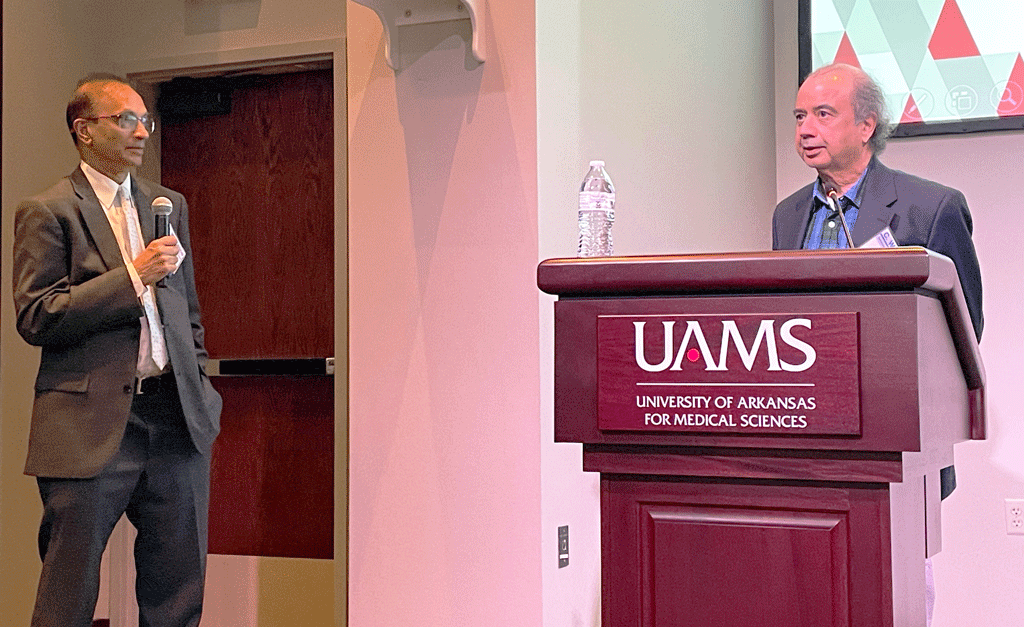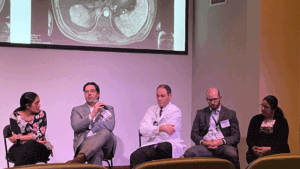UAMS Gastrointestinal Cancer Experts Share Perspectives at 24th C.W. Rasco Symposium
| About 150 physicians, nurses and researchers gathered Friday, March 8 at the UAMS Winthrop P. Rockefeller Cancer Institute for the 24th C.W. Rasco Symposium on gastrointestinal (GI) malignancies. The in-person event showcased some of the latest information on GI cancer screening, detection, treatment and research.
Rangaswamy Govindarajan, M.D., chief of the UAMS Division of Hematology Oncology, kicked off the event by remembering Charles William Rasco III, who died of colon cancer at the age of 59.
“UAMS is proud that this symposium honors Mr. Rasco, a kind and generous man from DeWitt, Arkansas, who filled his life with family and community service. He possessed a strong faith that guided him in his search to find a cure.”
Next, Ronda Henry-Tillman, M.D., chief of Breast Oncology, discussed colorectal screening guidelines, which have been lowered to age 45 for people at average risk. Screening colonoscopies markedly reduce the risk of colon cancer by finding and removing polyps before they have the chance to become cancerous.
UAMS genetics counselor Alexandrea Wadley, CGC, spoke to the group about discoveries regarding the genes associated with inherited colorectal cancers and the benefits and limitations of genetic testing.
“As we increase genetic testing, we’re learning that sporadic colon cancer may be less common than we believed, while hereditary forms are more common than we initially thought,” said Wadley.
Colorectal cancer is the third leading cause of cancer in men and women. In men and women combined, it is still the second leading cause of cancer deaths overall. Colorectal cancer rates have been declining steadily over time, except in younger people.
In 2020, 20% of colon cancers were diagnosed in people younger than 55 compared to only 6% in 1990.
Ahmed Safar, M.D., medical oncologist at the Central Arkansas Veterans Healthcare System, shared the latest on circulating tumor DNA in gastrointestinal cancers.
Govindarajan discussed the molecular targets in colorectal cancer followed by an update on endoscopy therapy from UAMS gastroenterologist Sumant Inamdar, M.D.
Ragesh Thandassery, M.D., a UAMS hepatologist, discussed early-stage hepatocellular carcinoma management and the role of locoregional therapy and liver transplantation.
The highlight of the event was a keynote speech from Jaffer A. Ajani, M.D., an internationally known professor of gastrointestinal medical oncology from MD Anderson Cancer Center.
“The landscape of upper GI cancer is changing, which is very exciting,” he said. “We shouldn’t get cancer, but still 17 million people globally get the disease. The human body has fantastic DNA repair machinery, but DNA damage persists and can turn into cancer.”
Ajani reported that damaged cells can persist in our body for 40 to 50 years. “When those cells accumulate, they are responsible for many of the diseases we see as we get older, including cancer.”
He discussed the unique nature of GI cancer biology, gastric cancer predisposing genes, the molecular diversity of the GI tract, emerging biomarkers in gastric cancer and the latest clinical trials.
“It’s no longer one cancer. It’s subsets of patients with different biomarkers that require customized treatment. We can’t treat them all the same. We have to have these biomarkers,” he said.
Following Ajani, UAMS thoracic surgeon Nicholas Tingquist, M.D., talked about gastroesophageal junction adenocarcinoma, followed by a presentation on hyperthermic intraperitoneal chemotherapy from UAMS surgical oncologist Michail Mavros, M.D.
The afternoon featured two multidisciplinary case panel discussions including UAMS clinicians from medical oncology, radiation oncology, radiology, surgery and interventional radiology.

